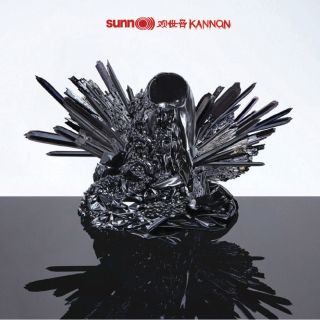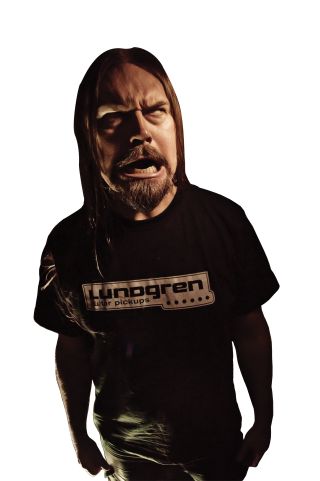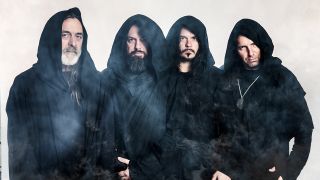For 17 years, Sunn O))) have very slowly boiled metal down to its base essence, reasserting the elemental power of the music by focusing on its fundaments of bass and volume. In so doing, duo Greg Anderson and Stephen O’Malley, adorned in robes befitting such ceremony, worship the source of such power: Black Sabbath guitarist Tony Iommi, whose riffs remain a defining statement.
Not only does the all-consuming nature of their sound nod to the past, it pushes the music forwards, taking metal to one of its many possible extremes, the final word in low-end sonic disturbance, the extension and manipulation of the form until the music loses any traditionally recognisable shape. It becomes mantra, a transcendental soundscape of sufficient might and magnitude that their gravity slows more than their deliberate anti-tempos. It even seems to slow time itself, consuming listeners within a realm of altered perception, and making Sunn O))) darlings of not only metal’s avant-garde, but of the wider experimental music scene.
What started off as a love for music shared between Greg and Stephen has grown into something unfathomably liberating. Its roots lie within humble beginnings in their home-town of Seattle, a hotbed of musical innovation that instilled within them the notion that music could be whatever they wanted it to be.
“Growing up in Seattle there were all these people who were pushing the boundaries of music in all directions, not just metal,” Greg reminisces. “Who knows? If we’d grown up somewhere else, in an environment not as sympathetic to musical experimentation, maybe Sunn O))) wouldn’t exist.”
New record Kannon, named after the Buddhist deity of mercy, is a three-track triptych, a sonic landscape best appreciated when permitted to wipe the slate of conscious thought clean, setting the imagination free as the elaborate paucity of composition washes over you in leaden waves. It is a sparser affair than its predecessor, 2009’s Monoliths And Dimensions, or the two collaborations that followed in 2014: Terrestrials, co-written with Ulver, and Soused, with legendary songwriter Scott Walker.

To imagine how one might go about creating such aural environs conjures up all kinds of alchemy. “I guess there’s some intuition and telepathy that happens between Stephen and I and it grows out of that,” suggests Greg, self-deprecatingly. “There are no premeditated ideas. Monoliths… started out similar, but was developed in a way more complicated way by bringing on extra instrumentation and embracing different musical theories and concepts. With Kannon there are elements of that, but it’s a little more stripped down. It’s reflective of the live shows we’ve been doing over the last four years, especially with Attila Csihar and his vocal contribution to the group.”
Attila, notorious for his role fronting the true lords of black metal chaos, Mayhem, ever bedecked in elaborate, otherworldly onstage garb, has had an indelible impact on the direction of Sunn O))) that cannot be underestimated, bringing not only his metaphysically compelling presence to their stage, but the depths of his creative insight. Could two now be a three?
“Attila’s involvement has been a very important influence on the direction of our music and this album is the pinnacle of that,” affirms Greg. “His involvement on Monoliths… was important, but it wasn’t as much of a collaboration as this. He’s played every single show we’ve done over the last eight years or so. His style, his aesthetic and what he brings to the group has really influenced the direction and where we went with Kannon.
“Attila came up with the concept,” he continues. “He’s a fascinating person; he’s interested in a lot of subjects. He has a lot more depth than people perceive. I could not be giving people a lot of credit, but there’s a lot of sensationalism with Mayhem, and I know that if you look into what they’re doing it is deeper than that, but the perception of Attila is that he’s this Satanic character from the black metal scene. I see him as something deeper.”
Attila’s vocal dexterity is unsettling. Within Kannon he’s a near-subliminal force, each serpentine hiss, every ululated rasp coiling around the elongated musical notes, dancing in and out of light and shade, a malefic smoke to consume the mind: less a vocal performance than an instrument in and of itself. “Exactly,” agrees Greg, “that was definitely something we thought would be interesting to focus on. Every record that we’ve done as far as vocals, they were mostly brought in after the fact. With this album the three of us worked together. The vocals were performed with the music.”

Accompanying Kannon is a set of liner notes written by academic Aliza Shvarts: an essay offering an intellectual analysis of the record that paints the album, and indeed Sunn O))) themselves, as an act of transgression within the metal world, itself a transgressive entity. Tackling issues of race, gender, musicality and spirituality, Aliza presents a complex take on the Sunn O))) myth, asserting that the band are making profound statements with each monumental release. Greg isn’t as convinced.
“I’ve read the liner notes a few times – they are incredible – but for me to get a proper grasp on them, I’m not there yet… but I don’t think that’s the point. To have Aliza’s notes on this record was to have a different viewpoint. Stephen and I were talking about liner notes on classic jazz records from the 60s – they’d have amazing, in-depth points of view about the album, and that’s what we were hoping for: someone who’d write something unorthodox.”
Such homage to jazz may seem disparate given the gulf between their musical styles, but as Greg explains, its free-spirited ethos is embedded in the very DNA of Sunn O))). “The aesthetic of jazz has really influenced us. It shares the same ideology – the openness and freedom. Everything we’ve done with Sunn O))) is embraced by that feeling and that vibe.”
For a band whose output has been so analysed, their thought-provoking depths so exalted by a growing community of academics fascinated by metal’s unique perspective, Greg’s take might seem disarming, at odds with the academic nature of the liner notes they’ve chosen to include. As he says, “I have a lot of respect for people who dig this deep into it, but for me creating this music, there isn’t a ton of analysis going into it, I don’t have all these theories and philosophies.”
The key to understanding such negation of Sunn O)))’s intellectualisation lies within their identification with jazz’s free spirit, not in a musically masturbatory way, but within a thirst for any musical influences that may inspire them, and the free will to bind them, warped beyond recognition the moment they cross the band’s event horizon, becoming something uniquely all-encompassing, seemingly without much prior intention. As Greg states, it occurs naturally. The feel for music harnessed by Sunn O))) creates realms of infinite possibility, breeding grounds for thought that’s led to their music being so studied and analysed. It’s a compliment to the band’s innate ability to wield such power, but one tempered by their desire not to be pigeonholed. Whilst the liner notes, and indeed much of what’s been written about them in the past, provides arguments as to what their music ‘means’, it is perhaps better to bear in mind that any thought or philosophy, whilst enlightening, is only one aspect of a much larger whole. There are so many possible interpretations you can lose yourself in navigating their possibilities, or simply let them go, experiencing the music as a mind-emptying trance. For them, there is no right answer, only the experience.
“It’s important for people to have their own perception,” enthuses Greg. “One of the reasons there are a lot of people that have gotten into it, is that it’s open for interpretation. There’s a lot of freedom in what we’re doing, especially in the live show – your mind can go in so many different ways; it’s inviting you, invoking you, to open up and let yourself go.”
KANNON IS OUT NOW VIA SOUTHERN LORD

A Love Extreme
Three more bands uncovering the heavy side of jazz.
JOHN ZORN
Avant-garde composer and multi-instrumentalist Zorn knocks most musicians into a cocked hat, writing with a liberated approach that encompasses any and all musical genres, and sometimes all at once; including the gleeful meddling with time-signatures and shredding guitars of metal.
EPHEL DUATH
Have you ever heard of breakbeats and jazz saxophone co-existing within the same song? Well, you have now, Italian duo Ephel Duath allowing their muse to evolve from its death and black metal origins into ever-expanding horizons of progressively minded, enraged composition.
FREDRIK THORDENDAL
Not content with breaking human brains with the blunted brutality of Meshuggah, guitarist Fredrik Thordendal uses his solo project to further up the ante with the complex eccentricities of his signature, clean-toned lead playing, inspired by jazz fusion guitarist Allan Holdsworth.

